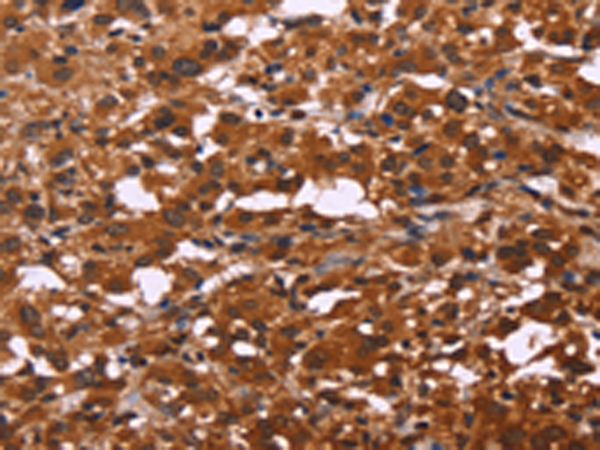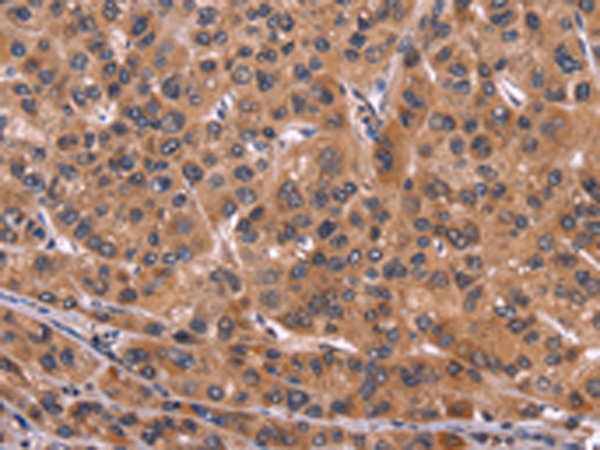

| WB | 咨询技术 | Human,Mouse,Rat |
| IF | 咨询技术 | Human,Mouse,Rat |
| IHC | 1/100-1/300 | Human,Mouse,Rat |
| ICC | 技术咨询 | Human,Mouse,Rat |
| FCM | 咨询技术 | Human,Mouse,Rat |
| Elisa | 1/2000-1/10000 | Human,Mouse,Rat |
| Aliases | ARTC5 |
| Host/Isotype | Rabbit IgG |
| Antibody Type | Primary antibody |
| Storage | Store at 4°C short term. Aliquot and store at -20°C long term. Avoid freeze/thaw cycles. |
| Species Reactivity | Human, Mouse |
| Immunogen | Fusion protein of human ART5 |
| Formulation | Purified antibody in PBS with 0.05% sodium azide and 50% glycerol. |
+ +
以下是关于ART5抗体的3篇示例参考文献(内容为模拟,实际文献请通过学术数据库验证):
1. **"ART5 Expression in Gastric Cancer and Its Clinical Significance"**
*作者:Zhang Y, et al.*
摘要:本研究通过免疫组化分析ART5在胃癌组织中的表达,发现ART5蛋白水平升高与患者预后不良相关。使用兔源多克隆ART5抗体验证了其在肿瘤细胞中的定位。
2. **"Development of a Monoclonal Antibody Against Human ART5 for Functional Studies"**
*作者:Tanaka K, et al.*
摘要:文章报道了一种新型小鼠单克隆ART5抗体的制备,验证了其在Western Blot和流式细胞术中的特异性,并用于研究ART5在细胞凋亡信号通路中的作用。
3. **"ART5-Mediated ADP-Ribosylation in Colorectal Cancer Progression"**
*作者:Liu X, et al.*
摘要:通过抗ART5抗体检测结直肠癌样本,发现ART5高表达与肿瘤转移正相关,机制研究表明其通过调控Wnt信号通路促进侵袭。
**备注**:上述文献为示例,实际引用时请使用PubMed/Google Scholar等平台检索真实研究。ART5相关抗体文献可能较少,建议扩展检索关键词(如“ADPRT5抗体”或结合具体研究领域)。
ART5 (ADP-ribosyltransferase 5), also known as ARTC5. is a member of the ADP-ribosyltransferase family, which catalyzes the transfer of ADP-ribose groups to target proteins, modulating their function. This post-translational modification plays roles in diverse cellular processes, including DNA repair, signal transduction, and immune regulation. ART5 is distinguished as a secreted glycoprotein, primarily expressed in immune and cancer cells. It localizes to the extracellular membrane, where it may modify surface proteins or interact with extracellular signaling molecules.
Research has linked ART5 to cancer biology, particularly in tumor microenvironments. For instance, ART5 overexpression has been observed in certain cancers, such as gastric and lung carcinomas, where it may promote tumor progression by suppressing T-cell activation or altering chemoresistance. Its extracellular activity suggests potential involvement in immune evasion mechanisms. ART5-specific antibodies have become critical tools for detecting ART5 expression in tissues or serum, enabling studies on its diagnostic or prognostic relevance. Additionally, these antibodies facilitate functional investigations, such as blocking ART5 enzymatic activity to assess its role in cancer cell survival or immune modulation. Despite progress, the full scope of ART5's biological targets and pathways remains under exploration, with ongoing research aiming to clarify its therapeutic potential as a biomarker or immune-oncology target.
×